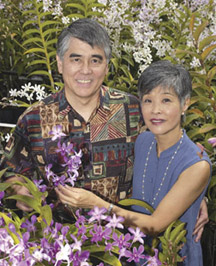Inside Story
UH employees are also donors
 Andrew and Merle Hashimoto
Andrew and Merle HashimotoPeople who work at UH believe in the institution enough to contribute monetarily, even those who don’t necessarily command the university’s largest salaries.
"My hope is that any student who has the desire and ability to benefit from higher education be able to experience it," says Andrew Hashimoto, dean of Mānoa’s College of Tropical Agriculture and Human Resources.
"I have seen many lives positively impacted by experiencing higher education." Without fanfare, Hashimoto and his wife Merle created a $35,000 endowment that generates interest to fund an annual scholarship.
Priority goes to students interested in bioengineering. "It is my academic home and a relatively new discipline that we want to encourage students to consider," Hashimoto explains.
"As dean, I tell a lot of people about the great things the college is doing. I think it is important that I put my money where my mouth is." Other CTAHR endowed funds have been established by retired county agent Fred Fujimoto, the late Professor Elmo Hardy and extension staff inspired by the late Roy Goff.
Kathryn Au, first professor to hold the Dai Ho Chun Chair in Educational Leadership, established the Au and Hew Family Endowed Scholarship in 2003 with an outright gift of $35,537. She also established the Kā Lama Teacher Education Initiative for the Waiʻanae Coast.
"I wanted to express my appreciation to the Hawaiian community, particularly the residents of the Waiʻanae Coast, for the opportunities I received to learn and grow as a literacy educator and researcher," Au says. "Also, I wanted to honor members of my family for their commitment to education, especially my mother, Mun Kyau Hew Au; aunt, Ah Lun Hew Zane, and uncle, Chong Meo Hew."
Higher education helps individuals understand the world around them and improve it, Au believes. "This philosophy actually worked. I see Kā Lama graduates gain insights, and I see them making the world a better place in their classrooms and schools and with their families and communities."
Alvin Yoshinaga, a junior researcher with the Center for Conservation Research and Training, started making gifts during the 1980s to take advantage of Hawaiian Telephone’s employee matching grant program. "I had been a PhD student in botany," he says. "I left UH with the intention of working a while, saving money and returning to my studies." Instead, he followed the executive tract, completing his MBA.
When restructuring at GTE reduced advancement opportunities, Yoshinaga accepted a position in Mānoa’s Hawaiian Evolutionary Biology Program. "I took a pay cut, but by that time I had developed the habit of making annual gifts to UH and had accumulated a large holding of appreciated GTE stock, from which I continue to make an annual gift," Yoshinaga says.
Relatively small gifts can have large effects, he adds. He gives to the College of Business and zoologist Leonard Freed, who coordinated a field studies program. This year, he designated a gift to assist a graduate student studying the feasibility of commercial ecotourism as a bird conservation tool in Vietnam. It appeals to his status as a Vietnam Vet with a background in both business and biology, he says. And it helps activities that fall between the cracks in the formal funding process.
"UH is filled with dedicated faculty and staff. It is always heartening when employees, who work so hard to better the institution, understand the differences their own philanthropic support can make," says Donna Vuchinich, president of the UH Foundation.